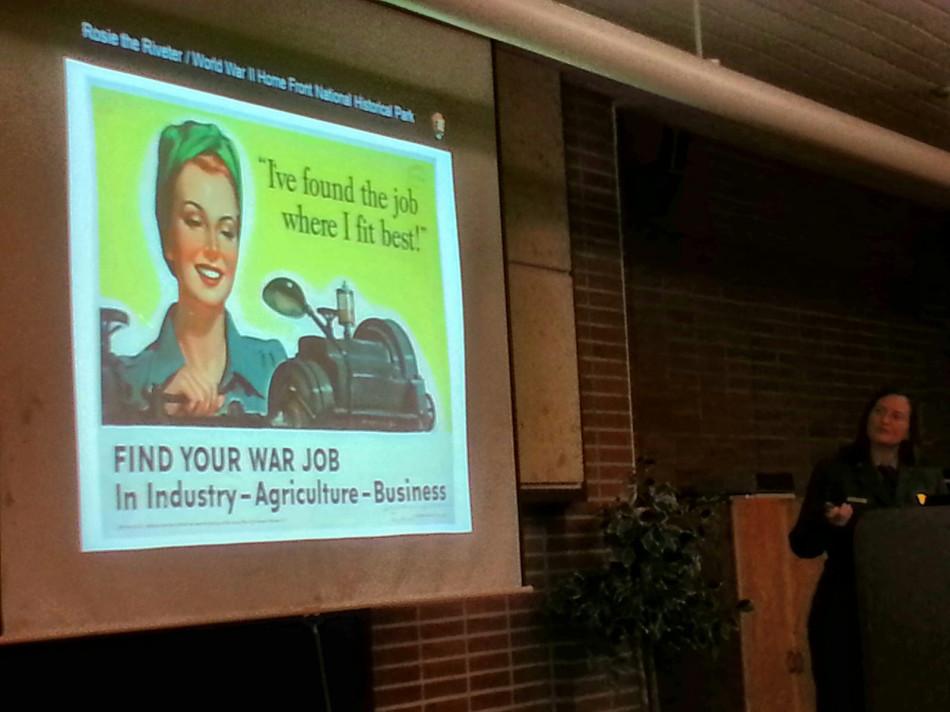Women fighting for employment equality since World War II
National Park Service Deputy Susan Fritzke describes the role women played during the WWII effort, at the 50 Year Anniversary of The Civil Rights Act at Diablo Valley College. The event was held in honor of Women’s History Month on March 11.
March 14, 2014
Equality in the workplace has come a long way, but the battle is far from over.
This was the theme of the Women’s History Month presentation which was held at Diablo Valley College on March 11, for the 50th anniversary of the 1964 Civil Rights Act.
The event was attended by a mix of men and women, the majority of which were students of the women’s studies program.
Speakers included Susan Fritzke, a National Park Service deputy, Mary Ann Irwin, history instructor at DVC, and Michelle Gienger, investigator for the Equal Employment Opportunity Commission.
“It is important to speak up right away when you feel like your rights are being violated, speak up right then, don’t let it fester,” Fritzke advised her audience. “Make it very clear where your boundaries lie from the very beginning.”
One of the national parks, which Fritzke oversees is the Rosie the Riveter World War II Home Front National Historical Park in Richmond.
Her presentation consisted of an overview of the call to duty that brought women in unprecedented numbers into the workforce, and the cultural shifts that resulted.
Today, real-life Rosie’s come to volunteer as docents at the national park, and after a recent staircase had to be repaired, the women, now in their 80’s and 90’s, were very critical of the welding work performed by the hired team.
Fritzke chuckled as she shared, “We had to keep these little old ladies away from our construction workers!”
Richmond was home to some of the most diverse and efficient teams of shipbuilders our county had ever seen and many women worked long hours as welders, building liberty ships at record speeds.
The fastest job was building a ship in just four days.
When the war ended most women wanted to keep their jobs, but almost all were laid off in the first six months, and the few remaining positions were given to men.
Irwin went on to explain how the sentiments regarding the WWII effort grew and contributed to other aspects of the civil rights movement, eventually leading to The Civil Rights Act of 1964.
This act made it illegal to discriminate based on race, color, religion, sex, or national origin. These protections included discrimination in the workplace .
When loopholes were developed to circumvent these protections, women banded together and formed associations for change, many of which, like the National Organization for Women, are still in existence today.
Irwin also said, “Focus on what you want. Take the steps to get there. You will have struggles, but see them as they are, obstacles to overcome along the way.”
Last to speak was Gienger, whose agency investigates and prosecutes discriminatory employers.
Gienger discussed the kinds of cases she deals with daily, many of which pertain to disparities in advancement, incidences of harassment and wage issues.
One of the newer areas of focus, is the inequality faced by migrant workers in California’s Central Valley, while the most extreme situation includes sexual assault of women while on the job.
The presentation closed with a declaration that discrimination against women in the workplace is still alive and well, and that it is all of our responsibility to stand up for our rights.
Irwin concluded the evening by reminding her audience, “Speak up for others, especially those younger or more vulnerable than yourself. If we are to remain silent, we become part of the discrimination.”
Student projects on the theme “Women in Social Change” are on display to view in the Trophy Room throughout the month of March.







































































